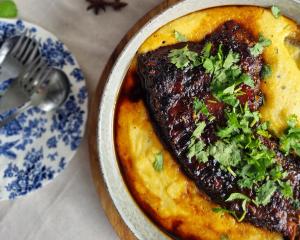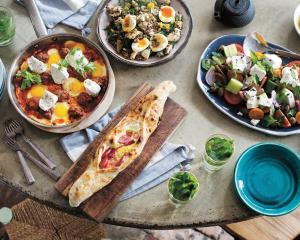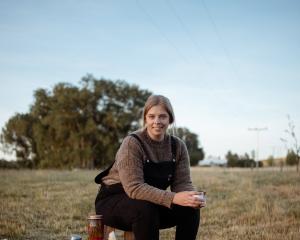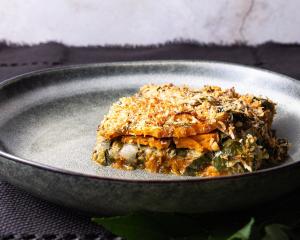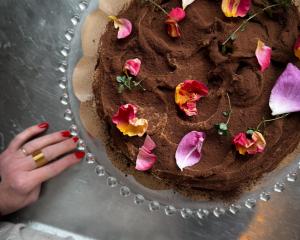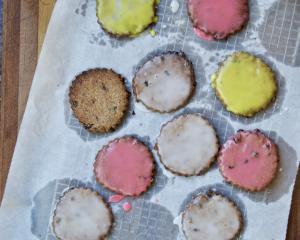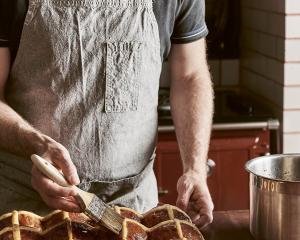
One way to do that is to cook for him or, if he is a keen cook, give him the gift of time to potter in the kitchen.
These recipes by David Frenkiel and Luise Vindahl might provide some inspiration.
Cooking is not always a means to an end, David Frenkiel says.
"The most joyful experience is sometimes the process itself. Embrace it."
Frenkiel and partner Luise Vindahl, who are from Scandinavia, started Green Kitchen Stories 13 years ago as a way to learn how to cook nutritious, fun and delicious vegetarian recipes together.
Their sixth book Green Kitchen: Quick and Slow has just been published. Frenkiel says they have taken all they have learned through years of writing cook books, raising a young family and cooking for others and boiled it down into recipes that essentially capture two very different cooking situations people find themselves in throughout a typical week - fast-paced days where people are short on time or slow days where people have time to potter in the kitchen.
"We want this to be a guide of sorts: how to balance the quick and the slow in the kitchen - and in life. It’s a cookbook, but also a conversation about how food can be our best therapy and ultimate joy."

"For most of my adult life I have experienced various forms of anxiety and cooking and baking has always been the cheapest (and the most delicious) form of therapy for me."
They follow some basic rules in what they eat starting with variety and balance, cooking with vegetables that are in season, eating a range of wholegrains, picking organic when affordable and leading toward vegan a couple days of the week.
Choosing a variety of gluten-free flours in their baking is another as well as experiementing with healthier everyday treats while still going all out with the occassional sugar-drenched dessert.
"Variety is the key factors in healthy eating. Variety is also fun."
The recipes have been created with a "flavour-first" approach with influence from their favourite Middle Eastern cuisine but admit their years of travel have meant some are "all over the place" when it comes to influences, like when they take their favourite Italian soup and mix it with their favourite New York deli sandwich.
Many of their recipes have been tested by their Kiwi recipe tester Nicola Moores who lives in Te Arai where she heads up the kitchen in her family’s sustainable luxery lodge.
"It has been such a great way for us to make sure that the ingredients we use are readily available and that our recipes are tried and true."
In their book they also provide advice on "flavour-boosting" your pantry, the condiments and prep people can use to add flavour to make weeknight meals easier.
There are chapters on breakfast, which mixes quick and slow recipes, and then the quick meal chapters followed by the slow meals and finishing off with sweet treats.
THE BOOK
This is an edited extract from Green Kitchen: Quick & Slow Joyful Vegetarian Recipes for Quick Weeknight Fixes and Slow Weekend Meals by David Frenkiel and Luise Vindahl, published by Hardie Grant Books, RRP $50 NZD, available in stores nationally. Photography: David Frenkiel

Savoury mini masala dosa
This is the love child of small American pancakes and Indian dosa. They are wonderfully flavourful, but it’s the coconut raita that takes them to the next level. This recipe involves a bit of digging in your spice cabinet, and it takes a while to fry all the pancakes, but it’s well worth the effort. Food euphoria happens when you get a bit of dosa, raita, chutney and coriander in the same bite.
Serves 4 (makes 15)Slow 40 min
For the pancakes
100g (scant ¾ cup) chickpea (gram) flour
70g (scant ½ cup) rice flour
1 tsp baking powder
1 tsp curry powder
1 tsp sea salt flakes
5 curry leaves
1 tsp yellow mustard seeds
1 tsp cardamom seeds
250ml (1 cup) sparkling water
4 Tbsp coconut oil, for frying
For the coconut raita
250g (1 cup) plain yoghurt
45g (½ cup) desiccated (dried shredded) coconut
1 tsp coconut oil
5 curry leaves, finely chopped
1 tsp mustard seeds
1 green chilli, finely chopped, plus a few slices to garnish
1 garlic clove, finely chopped
Juice of 1 lime
Sea salt flakes
To serve
Coriander, chopped mango chutney
First make the pancakes. In a large bowl, stir together the flours, baking powder, curry powder and salt.
Method
In a dry frying pan (skillet) over a medium heat, briefly toast the curry leaves, mustard seeds and cardamom seeds until they are fragrant and the seeds start to pop.
Transfer them to a pestle and mortar and finely grind, then stir into the flour mixture. Add the sparkling water and whisk to form a smooth batter. Leave to rest for 20 minutes.
Meanwhile, make the raita.
Scoop the yoghurt into a mixing bowl. In a dry frying pan over a medium heat, toast the coconut for 2-3 minutes until golden.
Transfer the coconut to the mixing bowl with the yoghurt, then add the coconut oil, curry leaves and mustard seeds to the same frying pan and cook over a medium heat. Fry briefly until the seeds start to pop, then scrape into the mixing bowl. (Don’t worry if some spices and oil are left in the pan: we will fry the pancakes in the same pan, and they will soak the flavours up nicely.)
Add the chilli, garlic and lime juice to the yoghurt mixture, season with salt and stir to combine.
When you are ready to make the pancakes, heat a couple of teaspoons of the coconut oil in the frying pan over a medium heat.
Working in batches, add 2-3 Tbsp of the batter to the pan for each pancake.
You should be able to fry 3-4 small pancakes at a time.
Cook for about 1 minute on each side, or until small bubbles start to appear, then turn over and cook on the other side.
Transfer to a plate and keep warm while you make the rest.
You should get about 15 pancakes.
Place the pancakes on a serving tray, scatter over some coriander and chilli slices, and serve alongside the raita and some mango chutney. Enjoy!
Notes:
Make it quick: Go for a store-bought raita.
Make it vegan: Use a plant-based yoghurt.

Miso porridge with banana & sesame brittle
This sesame brittle is our No 1 favourite crunch-maker for sprinkling over porridge (although it is also great over desserts and fruit salads, or for just popping it straight into your mouth). Miso in your morning porridge might sound intimidating, but it is very subtle and gives the porridge a depth of flavour that we love. We use a blend of half rolled oats and half jumbo oats for a creamy yet textured porridge, but if you only have one sort at home, that’s fine too.
Serves 2Quick 15 min
50g (½ cup) rolled oats
40g (½ cup) jumbo oats (or just use more rolled oats)
250ml (1 cup) oat milk (or cow’s milk), plus extra to serve
350ml (1½ cups) water
½ tsp sea salt flakes
2 tsp white miso
2 tsp butter
For the banana + sesame brittle
1 Tbsp coconut oil
1 Tbsp maple syrup
1 tsp grated fresh ginger
Small handful of walnuts, lightly crushed
3 Tbsp sesame seeds
1 banana, halved lengthways
Method
Place the oats, milk, water and salt in a small saucepan over a low-medium heat and bring to a simmer. Stir for 3-4 minutes until the water is just absorbed and the porridge has thickened. Stir through the miso and butter.
Meanwhile, to make the brittle, heat the coconut oil and maple syrup in a small frying pan (skillet) and add the fresh ginger. Stir in the walnuts and sesame seeds and let it sit for just a minute to caramelise. Make some room in the centre of the pan and place the banana slices there, cut-side down. Cook for just one minute. If the pan looks dry, add a little extra coconut oil or syrup.
Divide the porridge between two bowls and place a bananas half in the middle of each. Drizzle the sesame brittle over the bananas and serve with an extra splash of milk.
Notes:
• Don’t like miso? Use nut butter instead.
• Make it vegan: Replace the butter with coconut oil and stick to oat milk.
• No banana? Apple or pear slices will also work brilliantly.
• Show off! A few dollops of Greek or plant-based yoghurt makes this even better.

Chocolate rye bread
A typical Danish breakfast treat is a toasted piece of rye bread topped with a thin, melting slice of chocolate. A few bakeries have taken the concept further and sell rye buns studded with dark chocolate, combining sweet and earthy flavours, which I love. I asked my friend Mark Eriksen, a Danish sourdough baker, to help us recreate them. Stir together the ingredients in the evening and if you get up early enough, the buns can be ready for breakfast!
Makes 16 bunsSlow 12 hours
In the evening
325ml (1½ cups) water
100g (generous ¾ cups) mixed seeds (such as sunflower seeds, cracked rye and pumpkin seeds)
50g sourdough levain or 6 g fresh yeast
50g (½ cup) rye flour
50g (⅓ cup) all-purpose flour
25g chia seeds
1 Tbsp dark malt syrup, blackstrap molasses or maple syrup
In the morning
125g (¾ cup) rye flour
115g (generous ¾ cup) wholemeal flour
1½ Tbsp cacao powder
1½ tsp salt
300g dark chocolate, chopped (70%)
For the topping
150g (1¼ cups) hazelnuts, chopped
Method
In the evening, stir together the first batch of ingredients in a bowl. The mixture will be very wet, but don’t panic: that’s exactly how it should be. Cover with a clean, damp tea towel and leave at room temperature overnight.
In the morning, the mixture should be bubbly and smell fermented. Add the remaining ingredients and knead for a few minutes until the dough comes together (it should still be a little sticky).
Cover a tray with baking parchment. Rinse your hands in water (this will prevent the dough from sticking to them) and shape the dough into 16 even-sized balls. Place them on the tray, then sprinkle over the hazelnuts. Cover with a clean tea towel and leave to rise for two hours. (Because they’re made with wholegrain flours, they won’t rise as much as dough made with white flour.)
Preheat the oven to 190degC. Bake the buns for 15-17 minutes or until they have increased in size and a skewer inserted in the centre comes out clean.
Notes:
• No sourdough levain? We have provided measurements for fresh yeast if you don’t have sourdough levain, but obviously this version will be less tangy.
• Make a loaf: Just put the dough in a loaf pan and increase the baking time to about one hour.
Seasons - By Alison Lambert - Available for purchase now!

The Otago Daily Times and Alison have collaborated to bring you her first cookbook – Seasons.
This book is the ultimate year-round cookbook. Seasons is filled with versatile recipes designed to inspire creativity in the kitchen, offering plenty of ideas for delicious accompaniments and standout dishes that highlight the best of what each season has to offer.
$49.99 each. Purchase here.
$44.99 for ODT subscribers. Get your discount code here.



